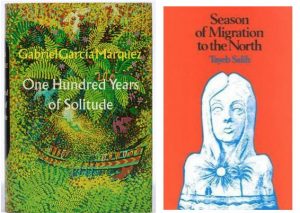
Book covers for One Hundred Years of Solitude and Season of Migration to the North.
In recent years, I have wrestled with certain dilemmas historical scholarship poses. A central one is how do we contemplate, write about, and represent people who do not appear within the archive? In the past, historical scholarship have been very puritan about basing their studies on archival sources. I have written a previous post about a very important intervention made within the study of history, that of ‘reading the archive against the grain.’ This, however, does not help when the people we seek to understand are wholly ignored or exist as mere fragments, constrained by the totalizing force of their oppressors, and as a result, the archive itself.
Such questions were first raised when I read Marisa J. Fuente’s thought-provoking work, Dispossessed Lives. This body of research explicitly engages in some of the concerns I have raised in the preceding paragraph: “How do we narrate the fleeting glimpses of enslaved subjects in the archives and meet hte disciplinary demands of history that requires us to construct unbiased accounts from these very documents?” Of course, the histories of enslaved people and colonial subjects are not only the ones diffi cult to write for lack of archival materials. The histories of those who were illiterate and thus left nothing behind for us to read and analyze or the histories of those with missing or incomplete archives all pose similar problems.
A parallel belief that I’ve had throughout my years of studying History at Columbia is the usefulness of literature in capturing the emotional stakes and transmitting the resonance of diffi cult histories. Certainly, fiction (rightfully) has no fealty to accuracy, but when reading post-colonial novels such as Season of Migration to the North or One Hundred Years of Solitude, I have often come away feeling somewhat more aware of how it feels to be subjugated or what it means to wrestle with these historical realities. Eleanor Johnson makes a compelling case in her book Waste and the Wasters about the use of analyzing poetry to understand how people across Medieval England grappled and processed ecosystemic change during the fourteenth century. As she notes, “if we want to find evidence of how regular people, not just chroniclers or annalists, might have experienced and understood climate change, we have to turn to the literary archive, to see how the lives of regular people are depicted in these straitened times.”
Of course, the use of literature as an archive is not a panacea. It is equipped to answer certain questions posed about certain populations, and it certainly cannot be used as the sole resource for understanding the lives of people who existed many, many years ago. However, as we become more concerned with unearthing the histories of those who had been long perceived as people who do not matter, I find it increasingly worthwhile to look towards other sources and strategies–such as speculative history–that make it possible for us to write them into history. That is one of many ways we can restore their place within the archive.
